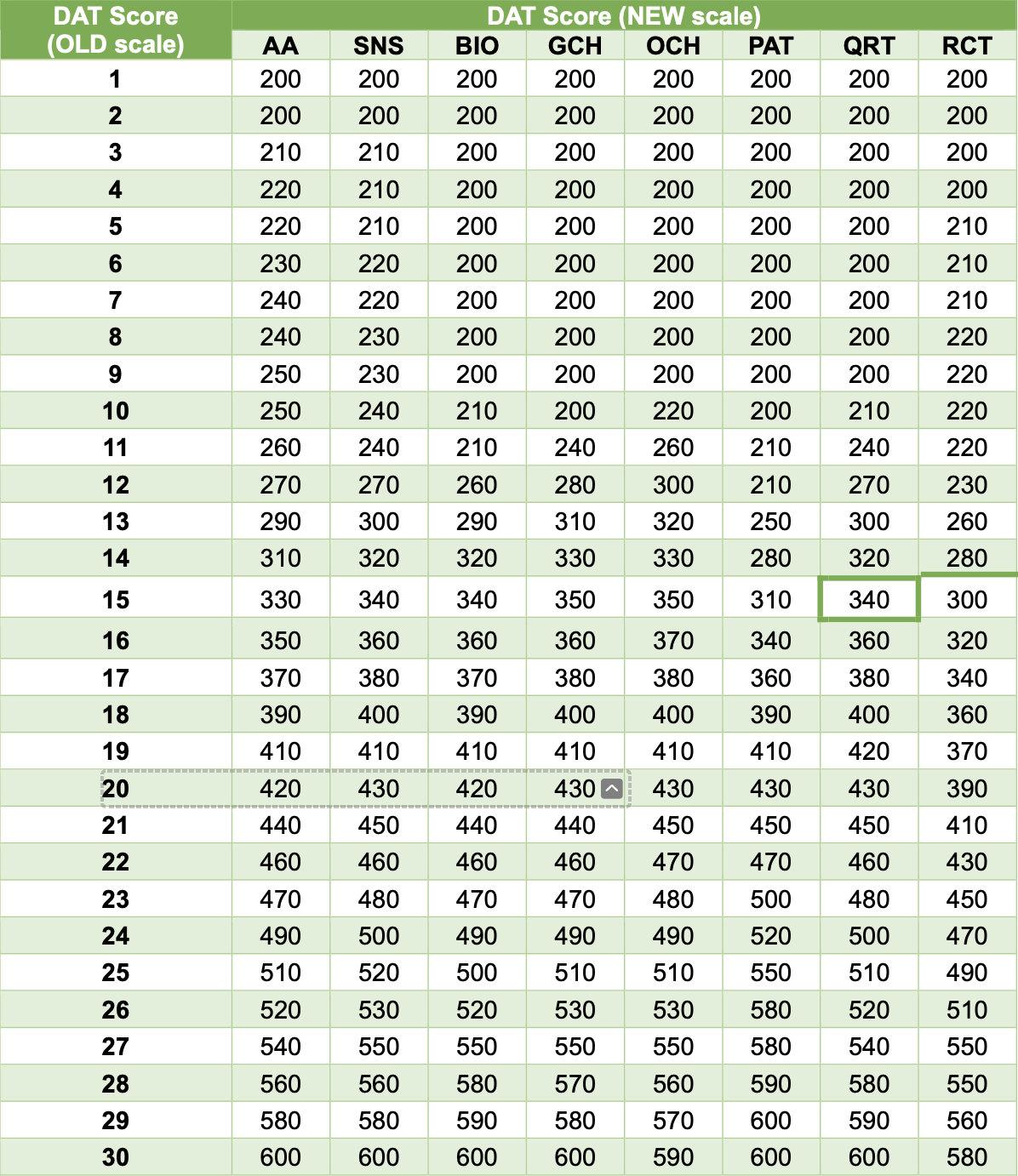.png)
How Is the DAT Scored? (Updated for 2025 – New Scale)
If you're pursuing a career in dentistry, the Dental Admission Test (DAT) is a critical hurdle in the admissions process. Given how competitive dental school has become, a strong DAT score can significantly set you apart from other applicants.
Naturally, questions like:
- What score should I aim for?
- How is the DAT scored now?
- What is the average DAT score?
...will cross your mind. This guide answers all of those using the new 2025 scoring system.
I. How Does DAT Scoring Work (Updated for 2025)?
The DAT is a standardized test that is composed of multiple sections: Biology (BIO), General Chemistry (GC), Organic Chemistry (OC), Quantitative Reasoning (QR), Reading Comprehension (RC) and Perceptual Ability Test (PAT).
In addition to individual scores for each section, you'll receive:
- Academic Average (AA): The average of five section scores (BIO, GC, OC, RC, QR). Note: PAT is not included in the AA.
- Total Science (TS): Based on your overall performance in the three science sections (BIO, GC, OC).
Each of these sections is now scored on a 200–600 scale, in 10-point increments — updated from the previous 1–30 scale. This change provides a more nuanced assessment of candidate performance and aligns DAT scoring with the ADAT format.
🔁 Old vs. New Scoring:
A 17–18 on the old scale roughly translates to a 400 on the new scale, which represents the national average. A score of 21 on the old scale would now fall around the 470–480 range.
A score of 21 on the old scale would now fall around the 470–480 range. Note: Raw-to-scaled score conversion tables are no longer published. All scores are equated to account for variations in test difficulty across different test forms.

With the above being said, the American Dental Association will release a DAT User Manual every year that compiles an average percentile for all the tests taken in that given year. Once released, test takers will be able to see how well they scored along with other data, such as the average scores for all sections, corresponding percentiles and even demographics. Unfortunately, the DAT user manual lags by a couple of years, with the most recent one being the 2018 manual. The 2019 DAT User Manual will be released at the end of 2021.
II. What Is the Average DAT Score?
Prior to reading this, you may have already visited a couple of websites to look for what the average DAT score is. Most websites give an average of 17-18 (~400 on the new scale) but without a source, it is tough to completely trust those numbers. In this post, we will use trusted sources such as the ADA to give you the most accurate picture of what the average DAT score is.
As stated previously, the DAT User Manual will contain all the statistics and percentiles that you are looking for. According to the most recent version of the manual, the average AA of 13,242 test takers in 2021 was 18.66 (~420 on the new scale) with a standard deviation of 3.03.
The user manual also details the averages for the years 1988, 2011 and 2016, which were 15.53, 18.22 and 18.71 respectively. As you can see, the average DAT score is on a clear rise over the years and the average for 2021 is nearly a 19. While we may have noticed a small dip this past year (COVID-19), we can still estimate that the average DAT scores will continue to be around 19 or higher for the following years.

In terms of the new scale, the national average for each section — and for the Academic Average — is centered at 400, with scores typically following a bell curve distribution. Here’s how to interpret your score:
- 350 or below = Below average
- 400 = National average
- 450+ = Above average / Competitive
- 500+ = Excellent / Top-tier
Percentiles are not yet fully published for the new scale, but a 450 is expected to fall around the 80th–85th percentile, based on preliminary concordance data from the ADA.
III. What Is a Good DAT Score to Apply to Dental School With?
With the average DAT score having risen almost 2 points in a decade from 17 (~390 on the new scale) to nearly 19 (~430 on the new scale), it is quite clear that applicants are putting more time and effort into studying and scoring well. This begs the question, what should you be aiming for and when should you retake? Fortunately, the American Dental Education Association, or ADEA, releases statistics each year on average applicant and matriculated scores.
As you can see below, the trend for first-year enrollees has also been on the rise, with the entering class in 2021 scoring an average of 20.7 AA and 20.4 TS. With the average score being 19 AA and the average enrolling student scoring over 20, any test taker should aim for a 21 or above in order to have the best chances of entering dental school. Naturally, the better you score, the better your chances are.
IV. Final Thoughts
While dental schools consider your application holistically, the DAT remains one of the most important academic metrics. Many programs have minimum score requirements or use DAT scores as a primary screening factor.
With the updated 200–600 scale, understanding how your score compares nationally is key. With the right strategy and study tools, achieving a high score is realistic — and can greatly strengthen your application.